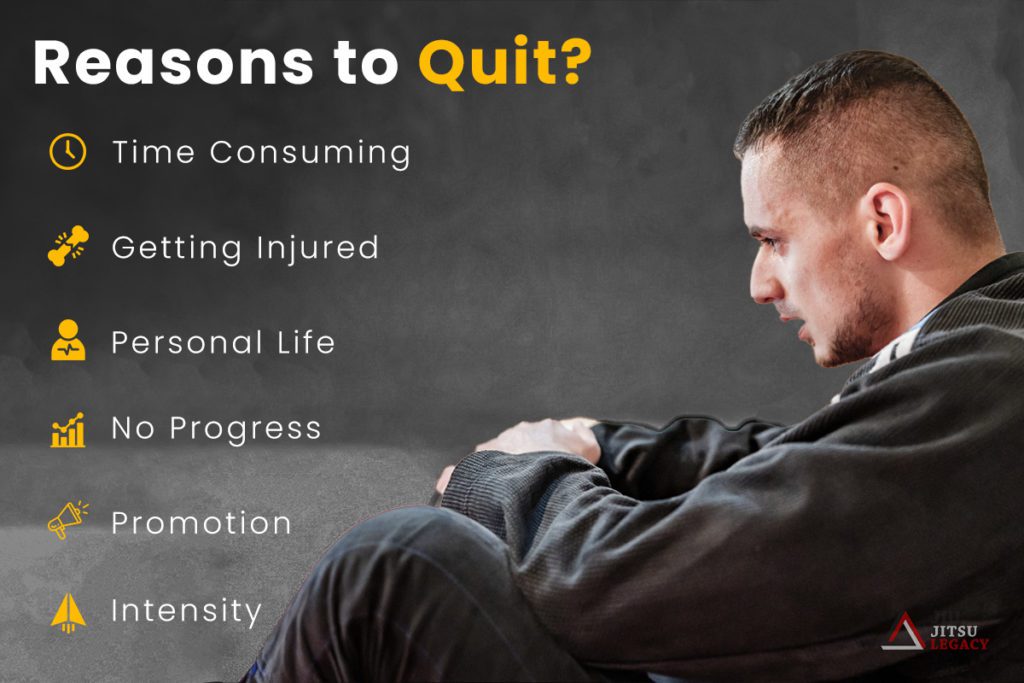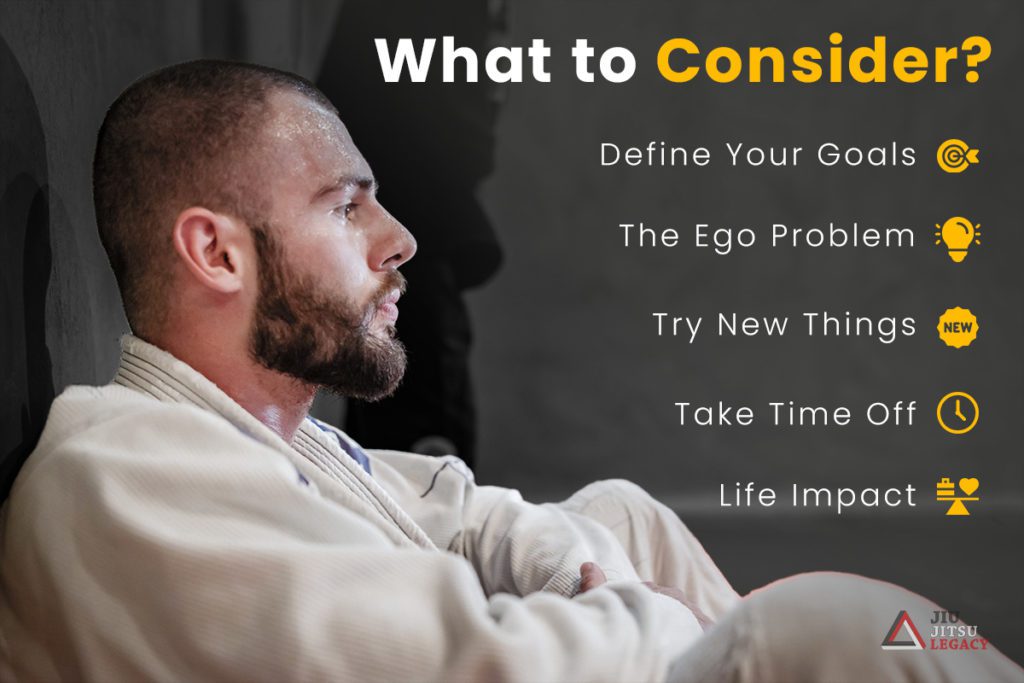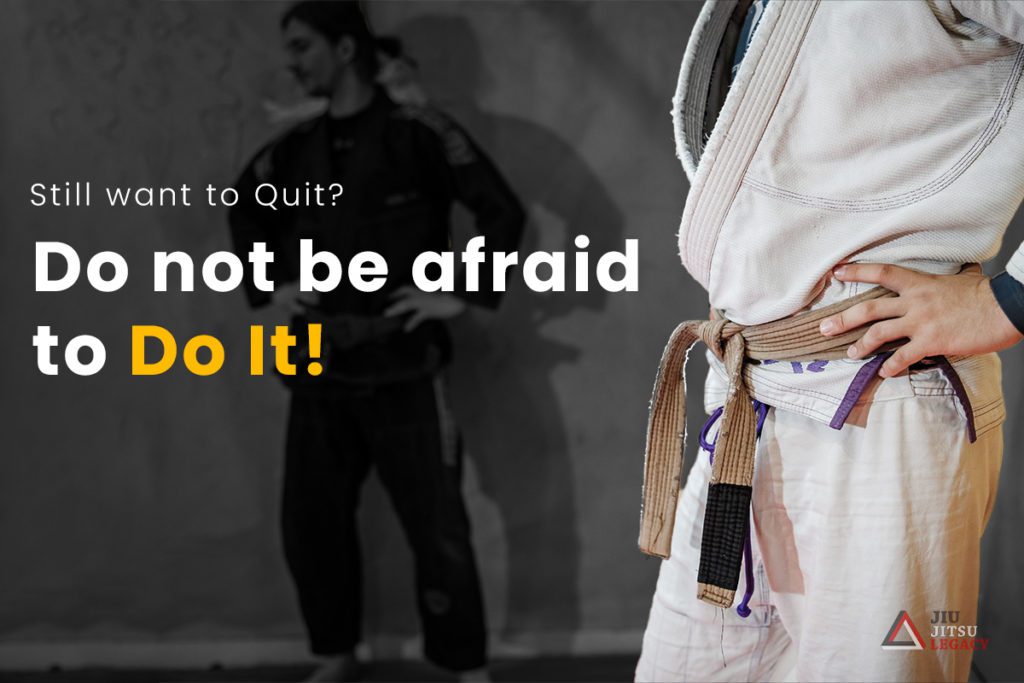There comes a time in everyone’s BJJ journey where quitting seems like the best choice. Maybe you’re tired of losing, tired of injury, or tired of the drama at your gym. Regardless of why you’re thinking of quitting, slowing down and considering the decision from a different perspective is the smartest choice you can make.
While we often joke that BJJ is a cult, the reality is that if you decide it’s your time to move on, that decision is OK! But, before you go, read this and sleep on it.
Jiu Jitsu is Not For Everyone
I think that it was Gracie Barra that popularized the phrase “Jiu Jitsu is for everyone.” As a piece of marketing, this is brilliant, but the statement is simply not true. There’s hardly anything in existence I can think of that is for everyone, let alone a combat sport.
I understand where the sentiment is coming from – physically, most people can do Jiu Jitsu. However, this really isn’t a question of whether or not someone can execute a given set of techniques with any measure of success. Instead, it is about whether or not someone will enjoy the process. If this sport doesn’t bring you joy, then you’re not wrong for not doing it!
From a mental standpoint, Jiu Jitsu is most definitely not for everyone. Fighting is something that many people are averse to. Moreover, fighting in extremely close proximity with different people, all while sweating on each other, is definitely not everyone’s definition of a good time. The combination of mental and physical discomfort can be very intense at times.
Why do people quit BJJ?

To be completely honest, I won’t try to go into every possible reason why somebody has quit BJJ – that is an impossible task. I can, however, share my experience as to the different reasons that have led people I know to consider quitting BJJ, and, on occasion, go through with it.
Time, Time, Time
Brazilian Jiu Jitsu requires time. If you’re only able to make it to class once every few weeks, a gym membership will be an expensive luxury, and you will likely not make much progress. In order to learn things and feel progress, you will need to train regularly, at least two times a week, preferably three or more.
With a regular BJJ class lasting one and a half to two hours, this means that you’ll have to allocate a good chunk of time to training. Add in the commute to the gym, showering afterwards, and extra loads of laundry and BJJ can feel like it consumes all of your spare time.
Trying to juggle training, a full-time job, family, and relationships is a tall order, and often the main culprit behind why people decide to quit Jiu Jitsu.
What to do about it:
Consider changing up your training schedule – look for morning classes or switch from gi to no-gi to save yourself from having to take so many trips to the laundromat.
Getting Injured
Injuries happen, and whether they are new ones from BJJ, or aggravated old ones, they end up being the reason people give up on the Gentle Art. Sometimes these injuries may threaten your career (finger injuries for a guitarist, leg injuries for anyone who has a job which requires you to stand all day), while other times they may make daily life hurt more than you’re willing to tolerate.
What to do about it:
Realize that there are no hobbies (video games included!) which are risk-free. See if you can train in a way to minimize your risks, perhaps by tapping early, avoiding the super heavyweight competitors, or only rolling with trusted individuals.
Life Gets In The Way
Getting married, getting divorced (significantly more rarely), getting a child (or two), moving to a different country, switching jobs… There are many things life can throw at us that will require us to uproot our comfort zones, and very often, people decide to sacrifice Jiu Jitsu because of it.
While BJJ is a global sport, there are plenty of places in the world where the local gyms are too far away to be convenient or don’t offer hours that match your schedule.
What to do about it:
This is a hard one – and may involve changing how you train. Are you able to get to morning classes? Or perhaps go straight to the gym after work? Take a step back and evaluate all of your options and ask yourself what you’re willing to change.
Struggling With Progress
This is a big one, and is among the most important mental reasons for people quitting BJJ. The thing with progress in Jiu Jitsu is that it is not immediate. There is a reason why it takes years to get a belt – things do not just magically click into place after a few weeks of training. Sometimes, even when you’re making progress, it just doesn’t feel like it.
What to do about it:
Write down small, measurable goals and keep track of your success over time. Sometimes we can’t see the forest because of all the trees.
Blue Belt Blues
I have no precise explanation as to why this phenomenon happens. It is not just a meme, people really do quit Jiu Jitsu at blue belt more than at any other level (other than those who never make it past the first few months).
My guess is that it is akin to an “adrenaline dump”, the adrenaline being the wish to shed the beginner tag that drives everyone. Once they get to the blue belt, people feel like they’ve accomplished something in Jiu Jitsu, but they simultaneously feel more pressure – pressure to be good enough or pressure to make it to the next belt.
What to do about it:
Set reasonable expectations for yourself. A blue belt doesn’t mean mastery of anything – in fact, it’s the second-lowest belt!
Comparing Yourself To Others
Very often this comes after belt promotions or tournament success. Suddenly you start thinking you should be doing better in the gym, and all the pressure and overthinking ends up making you perform worse than before. You then compare to others, how they are doing “better” than you, and you start losing the desire to come back to training.
What to do about it:
Take a step back – if you still want to accomplish anything in the sport, then quitting is not going to be the answer. Realize that every black belt has been through a phase like this. Remember that your journey is your own and getting wrapped up in comparisons to others won’t bring you happiness in BJJ, nor in life.
Intensity
Some gyms are focused on competing, and the way they train is more like an Olympic-level wrestling team. For a hobbyist BJJ practitioner this can lead to frustration, pain, injury, and overall a lack of enjoyment. Some people feel that their only option is to quit, as leaving their gym for another is turning their back on their family or somehow betraying their trust.
What to do about it:
Don’t get wrapped up in the creonte culture. If you don’t like the training environment at your gym, train somewhere else! At the end of the day, you need to pick a gym where you feel happy and safe.
Things To Consider When You’re Feeling Like Quitting BJJ

Whenever you’re considering quitting BJJ, know that there are things you can do to give Jiu Jitsu another chance before you pull the plug.
Define Your BJJ Goals
What are you trying to accomplish through Jiu JItsu? Are you trying to compete and win tournaments, learn to defend yourself, find a fun way to exercise, or just trying to make friends while doing something cool?
No gym offers every one of the above aspects in equal measure, meaning that your gym of choice should align with your goals. Sometimes, in order to do that, you might need to change which group you’re training in, or even switch gyms.
Keep in mind that goals vary and change with time, which may end up being a reason you’re thinking about quitting BJJ even as a seasoned grappler. Reassess, and try again.
The Ego Talk
Ego in BJJ is a concept that goes beyond just trying to beat everyone and never lose. That aspect of ego usually gets eradicated pretty early on. For those that are unable to accept defeat, quitting BJJ is actually a smart decision. As I said, Jiu Jitsu is not for everyone.
Those that can manage this one aspect of ego, though, will have to learn all about the different types of ego and how to deal with them. Ego, for example, is going out of your way to beat every lower belt and peer, but not even trying to give resistance to upper belts. Ego is trying to do a specific move on a specific person, even if you’re seeing that it is not working.
There are too many examples of ego in BJJ to cover in a few short paragraphs. The bottom line is that ego management goes a long way to remove thoughts of giving up on the sport, and as such, is an essential skill to develop.
This is an ongoing process. Someone who starts young may find they have to revisit issues of ego as they age and find their athleticism waning. If you aren’t having fun anymore, ask yourself if you’re caring too much about winning or losing.
Trying New Things
Switching up your regular routine is a great way to make everything in your life better. The same goes for BJJ. Stuck in a plateau? Start messing around with new positions or techniques. Allow the beginner’s mindset of bottomless curiosity to take over again.
Oh, and along the way, you’ll actually become better at a whole new aspect of BJJ, which will, in turn, sharpen those exact skills you got stuck with.
Take Some Time Off
Something that has done wonders for me is to give BJJ a break for a week or two. Sometimes, Jiu Jitsu can be too much. For most people that get hooked on it, it is not just training. It is YouTube videos, instructionals, trying out moves on loved ones, reading articles, daydreaming, or reading articles.
The answer is detox. Get away from everything Brazilian Jiu Jitsu for a couple of weeks. When you come back, you’ll see with fresh eyes what initially drew you to the sport.
Is Quitting BJJ Going To Improve Your Life?
A question worth asking yourself when you’re about to quit anything, not just BJJ, is this: Will giving up on this make your life better or worse?
If BJJ is hard for your schedule, the problem could be BJJ, or it could be your time management skills. Try to be as objective as possible and ask yourself how this change will really impact your life.
If you get to a “yes”, then, by all means, give up. However, if “No” is your answer, try to regroup, refocus, and figure out how to fit BJJ in your life. Chances are, you’ll miss it more than you think you will.
Still Wanna Quit? Do what you need to do!

At the end of the day, if you still want to walk away, then do not be afraid to do it. You don’t owe anybody anything, and if quitting BJJ is the best thing for you, long or short term, then do it. Oftentimes, it takes letting something go to discover how much it means to you. With BJJ, the best thing is that you can always come back to it when you want to.
Icons created by Freepik – Flaticon

Ogi is a black belt that does Jiu Jitsu full time and is very passionate about anything grappling-related.
He is also the head coach of Enso Jiu Jitsu in Macedonia and an aspiring Globetrotter.
